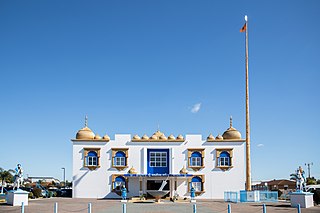| Total population | |
|---|---|
| 6,024 Iraq-born [1] | |
| Regions with significant populations | |
| Wellington, Auckland | |
| Languages | |
| New Zealand English and Iraqi Arabic also Kurdish (Sorani and Kurmanji dialects), Turkish (Iraqi Turkmen/Turkoman dialects), Neo-Aramaic (Assyrian and Mandaic), and Hebrew | |
| Religion | |
| Predominantly Christianity (mostly Eastern Orthodox and Eastern Catholic) and Islam Minority: Judaism and Mandaeism | |
| Related ethnic groups | |
| Arabs, Armenians, Assyrians, Azerbaijanis, Iranians, Mizrahi Jews, Turks, Mandaeans Some descendants of New Zealanders |
Iraqi New Zealanders constitute a small population immigrants from Iraq and New Zealand-born people of Iraqi heritage or descent.
The 2006 census found that 6024 New Zealanders were born in Iraq, although the figure of Iraqi New Zealanders will be higher than this as many New Zealand-born children of Iraqis may consider themselves to be Iraqi New Zealanders. The majority of Iraqi New Zealanders came to New Zealand as skilled migrants during the 1990s and many were Assyrian Christians who had been persecuted for their religion. The greatest concentrations of Iraqis are in Auckland and Wellington. [2]
Many Iraqi Christians (predominantly ethnic Assyrians belonging to the Chaldean Catholic, Syriac Catholic, Syriac Orthodox and Protestant churches) live in the North Shore region of Auckland city. These are mainly highly educated Assyrian Christians who were from Baghdad, the capital of Iraq, and Basra city in the south of Iraq, but originally heiling from Mosul. They came under the skilled migrant point system category in the mid 1990s. Many of these have settled in the Unsworth Heights and Albany suburbs. The North Shore Iraqi community is one of the fastest growing middle eastern communities in New Zealand. Many Iraqi immigrants had trouble working in their professional fields as there was a lack of employment during the early 1990s; however, by the late 2000s, many had established their own private businesses from private medical clinics to industrial firms.

Assyrians are an indigenous ethnic group native to Mesopotamia, a geographical region in West Asia. Modern Assyrians descend directly from Ancient Mesopotamians such as ancient Assyrians and Babylonians. Modern Assyrians may culturally self-identify as Syriacs, Chaldeans, or Arameans for religious, geographic, and tribal identification.

The Assyrian diaspora refers to ethnic Assyrians living in communities outside their ancestral homeland. The Eastern Aramaic-speaking Assyrians claim descent from the ancient Assyrians and are one of the few ancient Semitic ethnicities in the Near East who resisted Arabization, Turkification, Persianization and Islamization during and after the Muslim conquest of Iraq, Iran, Syria and Turkey.

Chinese New Zealanders or Sino-New Zealanders are New Zealanders of Chinese ancestry. The largest subset of Asian New Zealanders, many of the Chinese immigrants came from Mainland China, Hong Kong, Taiwan, or other countries that have large populations of Chinese diaspora. Today's Chinese New Zealand group is also composed of diasporic communities from Indonesia, Malaysia, Cambodia, Vietnam and Singapore. As of 2018, Chinese New Zealanders account for 4.9% of the population of New Zealand, and are the largest Asian ethnic group in New Zealand, accounting for 36.3% of Asian New Zealanders.

Kauri gum is resin from kauri trees, which historically had several important industrial uses. It can also be used to make crafts such as jewellery. Kauri forests once covered much of the North Island of New Zealand, before early settlers caused the forests to retreat, causing several areas to revert to weeds, scrubs, and swamps. Even afterwards, ancient kauri fields and the remaining forests continued to provide a source for the gum. Between 1820 and 1900, over 90% of Kauri forests were logged or burnt by Europeans.

Migration to New Zealand began only very recently in human history, with Polynesian settlement in New Zealand, previously uninhabited, about 1250 CE to 1280 CE. European migration provided a major influx, especially following the signing of the Treaty of Waitangi in 1840. Subsequent immigrants have come chiefly from the British Isles, but also from continental Europe, the Pacific, the Americas and Asia.

Indian New Zealanders are people of Indian origin or descent who live in New Zealand. The term includes Indians born in New Zealand, as well as immigrants from India, Fiji, other regions of Asia, parts of Africa such as South Africa and East Africa, and from other parts of the world. The term Indian New Zealander applies to any New Zealander with one or both parents of Indian heritage. Although sometimes the Indo-Kiwi definition has been expanded to people with mixed racial parentage with one Indian parent or grandparent, this can be controversial as it generally tends to remove the ethnic heritage or identity of the foreign parent or grandparent, which may be seen as insensitive to those with mixed parentage, who tend to value both their Indian and non-Indian parents and grandparents.

Christianity, which originated in the Middle East during the 1st century AD, is a significant minority religion within the region, characterized by the diversity of its beliefs and traditions, compared to Christianity in other parts of the Old World. Christians now make up approximately 5% of the Middle Eastern population, down from 13% in the early 20th century. Cyprus is the only Christian majority country in the Middle East, with Christians forming between 76% and 78% of the country's total population, most of them adhering to Eastern Orthodox Christianity. Lebanon has the second highest proportion of Christians in the Middle East, around 40%, predominantly Maronites. While Egypt has the largest Christian population in the Middle East. After Lebanon, Egypt has the next largest proportion of Christians, at around 10% of its total population. Copts, numbering around 10 million, constitute the single largest Christian community in the Middle East.

Ethnic groups in the Middle East are ethnolinguistic groupings in the "transcontinental" region that is commonly a geopolitical term designating the intercontinental region comprising West Asia without the South Caucasus, and also comprising Egypt in North Africa. The Middle East has historically been a crossroad of different cultures and languages. Since the 1960s, the changes in political and economic factors have significantly altered the ethnic composition of groups in the region. While some ethnic groups have been present in the region for millennia, others have arrived fairly recently through immigration. The largest socioethnic groups in the region are Egyptians, Arabs, Turks, Persians, Kurds, and Azerbaijanis but there are dozens of other ethnic groups that have hundreds of thousands, and sometimes millions of members.
New Zealanders of African descent represent less than 0.3% of New Zealand's population, although the number has been growing substantially since the 1990s.

Toi whakairo or just whakairo (carving) is a Māori traditional art of carving in wood, stone or bone.

New Zealander Sikhs number over 40,000 people and account for 0.9% of New Zealand's population as of 2018, forming the country's fastest-growing and fifth-largest religious group.
Iranian New Zealanders, informally known as Persian Kiwis, are New Zealanders of Iranian national background or descent who are expatriates or permanent immigrants, and their descendants. The 2006 census found that 2,895 New Zealanders were born in Iran, although the figure of Iranian New Zealanders will be higher than this as many of them are born in another country.
This is a list of Assyrian populations by country according to official and estimated numbers. Due to a lack of official data in many countries, estimates may vary.
Japanese New Zealanders are New Zealand citizens of Japanese ancestry, which may include Japanese immigrants and descendants born in New Zealand. Japanese people first began immigrating to New Zealand in the 1890s. Until 1920, 14 Japanese citizens resided in New Zealand. Japanese immigration was halted during the period of the Pacific War and recommenced around the 1950s. From this period onwards, Japanese immigration remained small until the 1990s. In 1997, Japanese peoples were the 19th-largest ethnic group in New Zealand. As of the 2018 census, 18,141 New Zealand residents identify themselves as Japanese New Zealanders.
Arabs in Romania are people from Arab countries who live in Romania. The first Fellah settlers came in 1831 - 1833 from Ottoman Syria to Dobruja. They assimilated in the Turkish-Tatarian Population. Some of them came to Romania during the Ceaușescu era, when many Arab students were granted scholarships to study in Romanian universities. Most of them were Algerians, Syrians, Palestinians, Iraqis, Libyans, Egyptians, and Yemenis. Most of these students returned to their countries of origin, but some remained in Romania starting families here. It is estimated that almost half a million Middle Eastern Arabs studied in Romania during the 1980s. A new wave of Arab immigration started after the Romanian Revolution. Many of the newly arrived Arabs came to Romania in the 1990s in order to develop businesses. In addition, Romania has people from Arab countries who have the status of refugees or illegal immigrants, primarily from North Africa, trying to immigrate to Western Europe. In particular, the European migrant crisis lead to Syrian people coming to Romania, although many Syrians were already living in Romania at the time of the crisis.
Arab New Zealanders refers to people from Arab countries, particularly Lebanon, Syria, Palestine, Iraq, and Jordan and also small groups from Egypt, Algeria, Tunisia, Morocco, Libya, Yemen and Sudan, who emigrated from their native nations and currently reside in New Zealand. The term also refers to descendants of diasporic Arabians such as descendants of Arab merchants to Asian nations, whose ancestral origins may be traced to merchants hailing from the Southern Arabian nations such as Yemen and Oman and the Arab nations of the Persian gulf region. Most Arab New Zealanders are of Lebanese and Iraqi descent because they were the first Arabs to arrive in New Zealand. Therefore, an Arab New Zealander is a New Zealander of Arab cultural and linguistic heritage or identity whose ancestry traces back to any of various waves of immigrants originating from one or more of the twenty countries comprised by the Arab world.
The term Irish New Zealander refers to New Zealanders of full or partial Irish ancestry. This includes Irish immigrants as well as New Zealanders of Irish descent. The term makes no distinction concerning religion and encompasses both Catholic and Protestant immigrants and their descendants; nonetheless, the chief criterion of distinction between Irish immigrants, especially those who arrived in the nineteenth century, is religion.
Lebanese New Zealanders refers to citizens or permanent residents of New Zealand of Lebanese ancestry. The community is diverse, having a large Christian religious base, being mostly Maronite Catholics and Greek Orthodox, while also having a small Muslim group of both the Shia and Sunni branches of Islam.
Assyrians in New Zealand are New Zealanders of Assyrian descent or Assyrians who have New Zealand citizenship. The Assyrian community in New Zealand began in the 1990s when refugees from Iraq and Iran settled in the country.